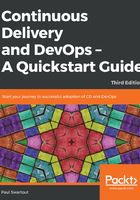
Openness and honesty
Openness and honesty are key factors to ensure that the implementation of CD and DevOps is successful. Without these behaviors in place, it's going to be very difficult to break down barriers and implement the much-needed changes throughout your organization. You already engaged the majority of the business during the elephant disclosure to obtain honest feedback about the current situation. You now need to ensure that you continue this dialogue with all concerned. Everyone involved in the product-delivery process, from developers and testers through change and release controllers to product owners and senior managers, must have a forum they can use to share their thoughts, suggestions, observations, worries, and news.
The most effective way to do this, as was the case previously, is via face-to-face human interaction, be this in person or virtually via video-conference systems (remember that video is preferable to voice as this allows for greater human interaction). There is one potential drawback to this approach—getting everyone in the same place at the same time can be difficult. We'll look at some ways to overcome physical environment challenges later; if face-to-face is not wholly viable most/all of the time, there is a rich and mature market in collaboration tools such as Slack, Flowdock, Yammer, or MsTeams (to name but a few), all of which provide you with real-time interpersonal interaction.
One thing to be mindful of when considering such collaboration tools—as most tools are public-internet-hosted Platform as a Service (PaaS) or Software as a Service (SaaS) offerings—is how their usage adheres to the IT security policy within your business. You should engage with your SecOps team and, if possible, get them on board with the implementation—thereby extending the CD and DevOps approach and community.
Whatever approach you choose, it is advisable that you set up some form of etiquette or guidelines so that everyone knows what is acceptable and what is not. Normally, common sense will prevail; however, with openness and honesty come responsibility and maturity—some may forget this, so a gentle reminder can always help. On the flip side, what should not prevail is a heavy-handed policing or moderation of the content as this will actively discourage openness and honesty and ultimately make the solution(s) redundant. You should review existing policies and engage with your HR team to see whether they can help.
Going back to the main theme of openness and honesty, let's look at what this means in terms of the previously introduced personas:

As you can see, it's far easier to fall into the not-so-good approach; however, the extra effort required to stay on the good approach path is far more beneficial as it will encourage open and honest dialogue.
It's all well and good to ask and encourage others to be open and honest, but you should also practice what you preach. As you go through the adoption of CD and DevOps, it is extremely important that you have regular open, honest, and truthful feedback from all concerned in terms of what is working with the implementation and, more importantly, what is not. Again, the simplest and most effective way is face-to-face human interaction; simply walk around and ask people. If this is not wholly viable, you should consider sort of lightweight survey solutions (such as Survey Monkey or similar) to capture feedback. The word lightweight is important here as no one will provide feedback on a regular basis if they have a 10-page questionnaire to fill out every few weeks.
You're hopefully getting an idea of what open and honest dialogue is all about, but there is another very important thing you will need to cater for: courageous dialogue. Let's now review what it is, why it's important, and how it comes into the equation.